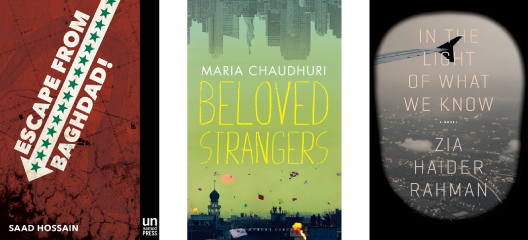Up-and-Coming: A Look at Emerging Authors from South Asia
 Literary luminaries like Salman Rushdie (The Satanic Verses) and Kamila Shamsie (A God in Every Stone) have dominated the South Asian writing landscape, but there are more heavyweights who merit recognition. The following authors offer a glimpse of contemporary English writing emerging in the subcontinent.
Literary luminaries like Salman Rushdie (The Satanic Verses) and Kamila Shamsie (A God in Every Stone) have dominated the South Asian writing landscape, but there are more heavyweights who merit recognition. The following authors offer a glimpse of contemporary English writing emerging in the subcontinent.
Saad Z Hossain’s upcoming Escape from Baghdad! (The Unnamed Press, March 2015) is the sci-fi and fantasy writer’s debut novel, characterized as an Arabian–Nights–esque thriller. Having set the book in modern-day Iraq, Hossain started off his research reading blogs written by American soldiers in Iraq, and then braided together Norse and Greek mythologies. Writing science fiction can be a challenge, but Hossain accomplishes it well, explaining that it’s an imaginative genre: “[Y]ou throw your net for X number of years, and you kind of predict what this place will be like in fifty years. It doesn’t have to be reality.”
Zia Haider Rahman’s In the Light of What We Know (Farrar, Straus and Giroux, April 2014) highlights dislocation, relationships, and the mathematical elegance of Gödel’s Incompleteness Theorem. This debut novel, exploring caste, class, banking, and politics, illustrates the rootlessness experienced by many diasporic writers in the era of globalization. In In the Light of What We Know, he writes, “I believe that he had failed in this mission and had come to see, as he himself said in so many words, that understanding is not what this life has given us, that answers can only beget questions, that honesty commands a declaration not of faith but of ignorance, and that the only mission available to us, one laid to our charge, if any hand was in it, is to let unfold the questions, to take to the river knowing not if it runs to the sea, and accept our place as servants of life.”
Maria Chaudhuri is the author of Beloved Strangers (Bloomsbury, January 2014), a memoir about moving from Bangladesh to the United States. Chaudhuri grew up in Bangladesh and subsequently charts everything from family jouneys to our hidden quest for independence. Details of Bangladeshi culture are intertwined in this absorbing read from the subcontinent: “It was not that home, for me, was an unhappy place. But in our home, joy had an ephemeral quality to it. It was like trying to catch a glimmer of sunshine that slips in through a crack and dances around the room but never quite settles. We were novices at capturing joy, never being able to hold on to it for very long.”


